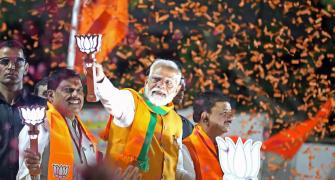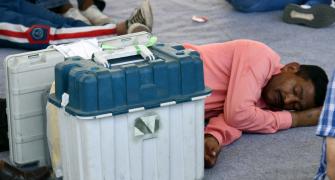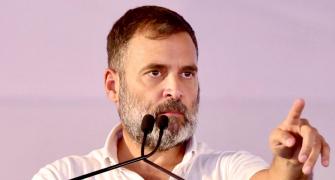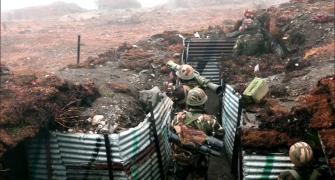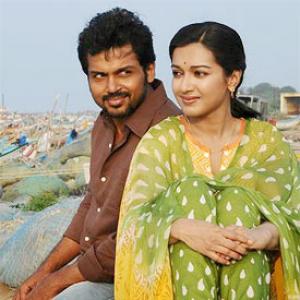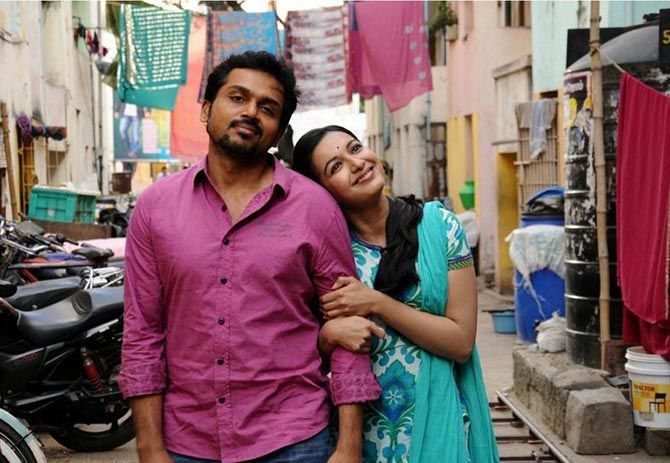
Two years ago, director Pa Ranjith created a sensation with his debut film, Attakathi, a breezy romantic comedy.
The film was a huge success and earned rave reviews.
His second venture, Madras, has been running to packed houses since its release a couple of weeks ago.
Based on the lives of the underprivileged in North Chennai, the film tells an intriguing tale of a nondescript old building wall that becomes a bone of contention between two political parties, leading to senseless violence and bloodshed over two generations.
The film features Karthi and Catherine Tresa in the lead and is produced by Studio Green.
In this interview with Rediff.com's S Saraswathi, Pa Ranjith opens up about what inspired the film and his characters.
Your film has received a tremendous response; how does it feel?
It feels wonderful. Before the release of the film, we had some doubts. I was apprehensive about the Chennai slang and also feared that the plot might seem too insignificant.
We felt people fighting over a mere wall and an entire film devoted to this one issue might not go down so well.
But the overwhelming response of the audience has proved that the only thing that matters is how interestingly you narrate the story.
They have accepted my film and that makes me very happy.
Was the film received just as well in cities other than Chennai?
Initially, it was a little slow in other centres. But through word-of-mouth recommendation, it soon picked up in all areas.
Today, we are doing extremely well in all centres. 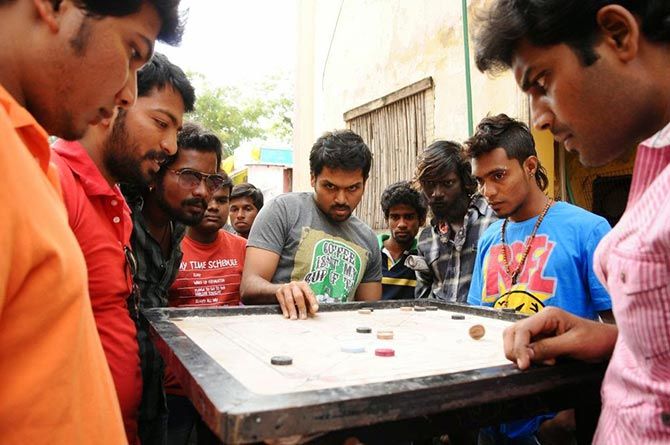
What inspired you to make a film on a subject as insignificant as a building wall?
I used to work as a signboard artist. We were extremely busy during the election season.
I noticed how important it was for political parties to maintain control, even if it was over a mere building wall. I have seen the problems that can arise from such an insignificant issue.
For the politicians, this is no ordinary matter. It is a fight for supremacy and related to power.
This interested me and sparked the idea for the script.
You have based your story in North Chennai; are the characters too inspired by people living in this area?
All my characters have been inspired by real people.
I come from a small village near Avadi. I have a lot of friends in North Chennai and visit them often.
The lifestyle of the people, especially the underprivileged, in this area has always intrigued me. Despite living in such cramped spaces under difficult conditions, they live such a complete life.
During my frequent visits, I noticed that even though they lived in the city, the ambiance here was more rural.
They are a closely knit community; at the slightest problem, they get together and offer their help and support.
For them, it is never about one man's personal problem, everyone is involved.
Also, I believe that North Chennai has never been fairly portrayed in Tamil cinema. I wanted to depict their life in an authentic and honest manner.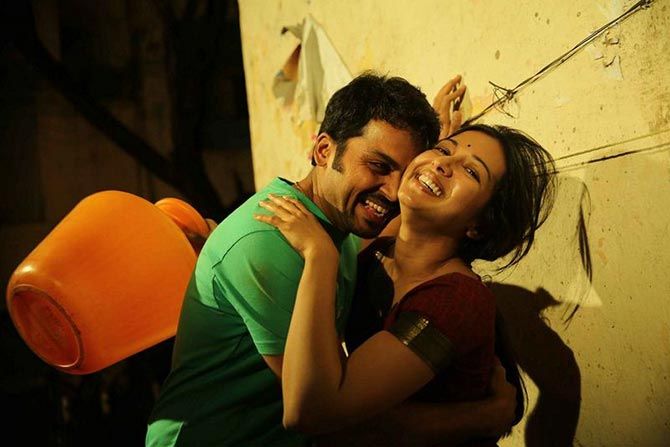
Was it difficult to convince your producers to back such an unconventional project?
After Attakathi, everyone wanted another romantic comedy. But I was adamant that I wanted to do something else.
I had written the script for Madras and was determined to work on it. Though a bit hesitant initially, the producers decided to back me.
Was the script written with Karthi in mind? How did he prepare for the character?
I was very particular about who I wanted for the main lead.
The concept was a bit dark, so we felt a more popular face would take care of the commercial angle. We tried a few top names, but nothing panned out.
When Karthi read the script, he immediately agreed. Karthi has a certain innocence, which I felt would suit the character.
We had workshops for the entire cast, including Karthi. We worked on the slang, body language and the accent.
We had several rehearsals before the actual shoot. Everyone was given a script with instructions on what was expected from them.
During the shoot, however, I gave them complete freedom. Only when it felt too exaggerated, would I interfere.
The character Johnny, a vagabond, seems to have become very popular.
There is a character like Johnny in almost every locality. That is the reason people instantly connect with him.
Though they seem mentally disturbed and are found aimlessly loitering in the streets, these people are highly intellectual and can talk about a wide range of subjects.
They understand politics and are extremely knowledgeable. It is unfortunate that due to some problem in their life they are reduced to such a state.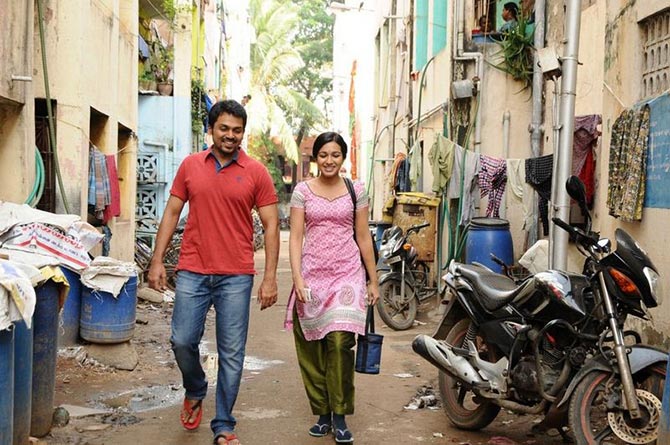
People seem to relate to the situations and dialogues as well.
It has never been my style to give any special attention to dialogues.
For me, it has always been about the story, the characters and their life.
My dialogues have to be an extension of this, not a separate entity.
When I show life exactly how it is lived, by authentic characters in real-life situations, the dialogues naturally become more real.
I don't like to sound too preachy or cinematic.
Was the entire film shot in North Chennai? What were the challenges you had to face?
I knew that the environment was the key factor in my film, and I wanted to get it absolutely right.
We spent 71 days shooting in extremely crowded locations in North Chennai. But thankfully the people in the area were totally supportive. They were very tolerant, never interfered in our work and
helped us as much as they could.
We just allowed them to continue with their normal routine, while we shot around them. We advised them to ignore the camera and go about their work.
In real life, when two people are having a conversation, the rest of the world does not stop, everyone continues with their work. They are either talking, playing, arguing or fighting.
Usually in films, they get a couple of extras to walk about in the background, but I made sure that every scene was authentic. I even had an assistant director looking into only the background elements.
Are we more tolerant of unconventional films now? Five years ago, would your script have worked?
It is we who have created this hype about a particular trend and what works and what doesn't. The Tamil audience has always enjoyed, encouraged and celebrated unconventional films.
They are extremely supportive; you just have to connect with them on an emotional level.
Over the years, many filmmakers strived to be different and succeeded. When S P Muthuraman was making films like Sakalakala Vallavan, which was a huge blockbuster, we also had a Mahendran, who made a film like Uthiripookkal, which is considered a landmark film in Tamil cinema.
It is all about how interestingly and honestly you can narrate a tale.




